
Delhi to Kathmandu Itinerary
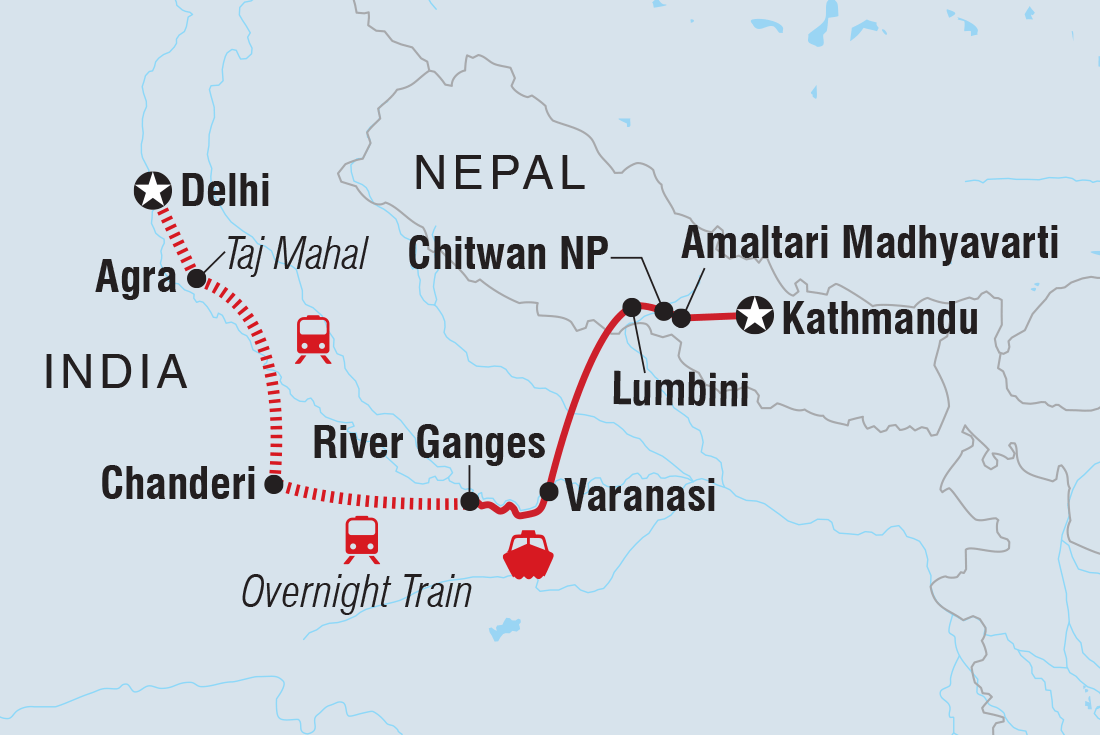


Namaste! Welcome to India. Your adventure begins in Delhi – India’s busy capital city, known for its street food, bazaars, museums and galleries. Meet your local leader and fellow travellers at a welcome meeting at 1 pm today. After, follow your leader as they show you through the streets of Old Delhi before you hop in a rickshaw for a different view. During your excursion, you’ll visit the Jama Masjid – Delhi's oldest mosque and one of its most impressive buildings – and the Sheeshganj Gurudwara (Sikh Temple) to learn about the Sikh religion. This evening is yours to take in the energy of Delhi and get ready for the adventure ahead, perhaps over a tasty Indian meal with your group members.
This morning, depart Delhi via train to Agra – home to India’s most iconic building, the Taj Mahal. This 17th-century palace was built in the style of Mughal architecture and surrounded by trimmed English gardens. You’ll get your chance to see it up close on a rickshaw tour across Agra, whizzing past the city’s many important sites and busy chowks (marketplaces). Later this afternoon, visit Akbar's Mausoleum – a red sandstone and marble tomb built to honour one of the great Mughal emperors, Akbar. Inlaid with intricate patterns, both inside and out, the tomb is another of Agra’s impressively striking monuments.
Today, you’ll get a chance to see the beauty of the Agra Fort up close on a tour with a local guide. Considered one of the most impressive forts in India, over time, the Agra Fort has been used as a military base, a palace and a prison. Later today, hop on a train to Lalitpur – a private transfer will then pick you up from the station and take you to your hotel in Chanderi. The rest of the evening is free to relax.
Get to know Chanderi on a guided tour with your leader this morning. With a history stretching back to the 11th century and a strategic location between the Bundelkhand and Malwa borders, the city is full old palace, forts, mosques, temples and mausoleums. Take a wander around the cobbled streets of Old Town, learn about the significance of the grand Badal Mahal Gate and visit Jama Masjid – a 15th century mosque dating back to the Mughal era. The rest of the day is free to unwind or explore at your own pace – your leader can offer tips on things to do.
Take a private transfer to the town of Orchha. Located on the banks of the Betwa River, Orchha was once a hunting area that became a site of 16th-century palaces and temples. Maybe grab some lunch, then head to Orchha Palace for a guided tour. Built by Bir Sing Deo for his friend Jehangir, the great Mughal ruler, the palace is an important landmark here. While inside, look out for the grand Iwans (domes) that were built large enough to allow the movement of war elephants. You’ll also have access to day rooms to freshen up. For dinner, you’ll dive into the region’s flavours at a cooking demonstration and feast on your creations. Then, it’s time to hop aboard an overnight train to Allahabad – the starting point for your Ganges boat journey.
Arrive in Allahabad this morning. You’ll have access to day rooms to freshen up after the journey before making your way to the Ganges for a cruise on a small riverboat. The Ganges is very important in India, not just because it’s sacred in Hinduism but also because it connects millions of people to their livelihoods. A support crew will be on hand as you cruise the waterway, passing villages and watching life along the banks. When you arrive at your campsite, sit back and relax, or you might like to read a book or play some cricket. End the day watching the sunset over a vegetarian meal prepared by the boatmen.
Leaving your boats at Chunar, transfer by private vehicle to Varanasi – one of the holiest cities in India. Varanasi is the ultimate destination for Hindu pilgrims who travel far and wide to step foot in this spiritual city. Your leader will take you on a walking tour of the Old City, passing temples and shrines, stopping to watch as rituals are performed. This evening, see the spirituality of this city in motion at the sunset candle flower ceremony. The daily ritual involves people sitting a small candle on a leaf which is then placed on the water, accompanied by chanting, songs and fire performances.
This morning you might like to wake up early to watch the sunrise by the river and take in the many sights along the ghats. At lunchtime, you'll jump on a rickshaw for a tasting tour through the vibrant streets to some of the city's most iconic eateries. Dig into a range of savory and sweet snacks like chaat, samosas, jalebi and lassi while getting a glimpse into Varanasi’s rich culinary heritage. You have free time for the rest of the day – and there are many ways to soak up your time here! You could wander the laneways behind the ghats, shop for local silk or even take a yoga class. If you have time, perhaps visit the nearby Sarnath – one of the four main Buddhist pilgrimage destinations. Sarnath is where Buddha preached his message of the path to enlightenment and features stupas (Buddhist shrines) and museums to explore.
Today, wave goodbye to India and say namaste to Nepal, as you cross the border at Gorakhpur. This will be a longer journey, so maybe get stuck into a good book or your favourite podcast. When you arrive in Nepal, take a private bus to your hotel in Lumbini – the birthplace of Gautama Buddha, the founder of Buddhism, and one of his four holy places of pilgrimage. Later today, travel to the Lumbini Heritage Park, home to the Ashoka Pillars, where you’ll hop on cycle rickshaws to the Maya Devi Temple – the actual site where Lord Buddha is thought to have been born.
Today, your journey continues as you travel by private vehicle through the Terai to the Amaltari Madhyavarti village homestay – your stay for the night. A well-known Indigenous group in Nepal, the Tharu community who live here are known for their distinctive culture and lifestyle. When you arrive, have lunch in the community with your group, get to know some of the locals and then enjoy some free time to freshen up. After, you’ll head out on a 4WD drive to the lake to enjoy some afternoon tea. Learn about village life in the community over dinner tonight and sit down for a home-cooked, traditional meal made by the locals.
Start your day with a guided walk around the Tharu community with one of its members. Your local guide will show your group the Indigenous architectural styles, as well as the farms and produce used to feed and economically sustain the community. Along the way, you might learn a little more about life here as they share their customs, values and stories with you. After, say goodbye to your hosts, and head for your lodge in Chitwan National Park via Twenty Thousand Lakes (Bis Hajaar Tal) – Nepal’s second-largest natural wetland and a great introduction to the wildlife of Chitwan. Look out for migratory birds, crocodiles, and, if you’re lucky, an Indian rhino.
After breakfast, take a walk to the Rapti River, where you’ll be taken on a boat or jeep safari through the national park. Keep your eyes on the sky for the many brilliantly coloured birds of the area. Then, sit down for a picnic lunch by the river. Keep your eyes peeled for gharials – this fish-eating crocodile has long been hunted for the supposed aphrodisiac qualities of its snout. Learn more about them when you drop by the crocodile breeding centre. Once back at your accommodation, there’ll be time to relax or to take part in optional activities offered by the park. Tonight, you’ll be treated to a cultural performance by the local Tharu community.
Today, you'll travel by bus from Chitwan to Nepal's capital – Kathmandu. Try to grab a window seat for this trip, as the views are not to be missed. Look out over Nepal’s rural landscape of rice terraces, mountain-side villages and flowing rivers – all with the backdrop of the Himalayan mountain range. Arrive in the city and get your bearings, maybe with a walk through the narrow streets to the traditional architecture of Durbar Square. Or stop for a shop at the markets and bazaars. While in Nepal, make sure you sample the local favourite food - momo (Nepali dumplings). Ask your trip leader for a place to grab dinner.
Today you’ll head out to Kathmandu's most important Buddhist shrine – the ancient Swayambhunath Temple, known to tourists as the Monkey Temple. The sleepy, all-seeing Buddha eyes that stare out from the top have become the quintessential symbol of Nepal. You’ll also join the pilgrims at Bodhnath Stupa – the largest stupa in Nepal and one of the holiest Tibetan Buddhist temples. Then, visit Pashupatinath – the most famous Hindu temple in the country – located on the banks of the holy Bagmati River. Here you will see Hindu holy men (sadhus) meditating and pilgrims bathing. The rest of the day is free for you to enjoy Kathmandu. One way to spend your time is to take a scenic flight through the mountains – great if you’re not able to take on a trek.
There are no activities planned for your last day, and you can depart the accommodation at any time. If you would like to stay an extra couple of days, and it's recommended that you do, just get in touch with your booking agent ahead of time. If you do extend your stay, maybe check out the great range of Urban Adventures – like the Kathmandu: Rickshaw Night Explorer tour.

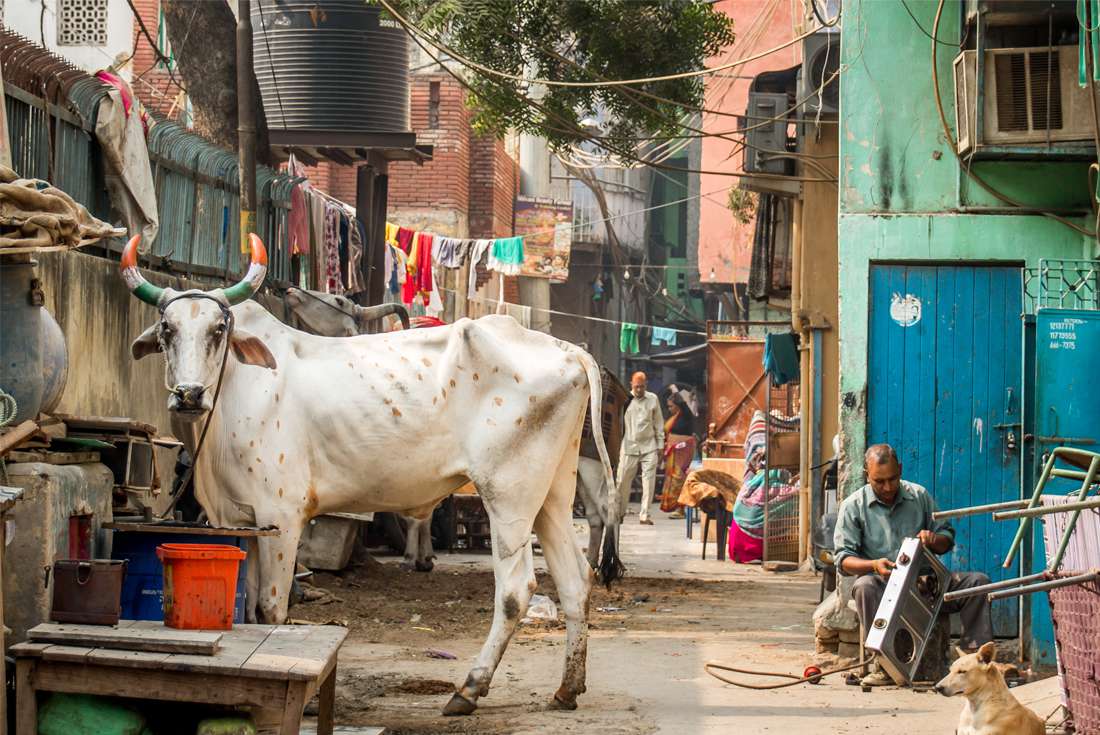
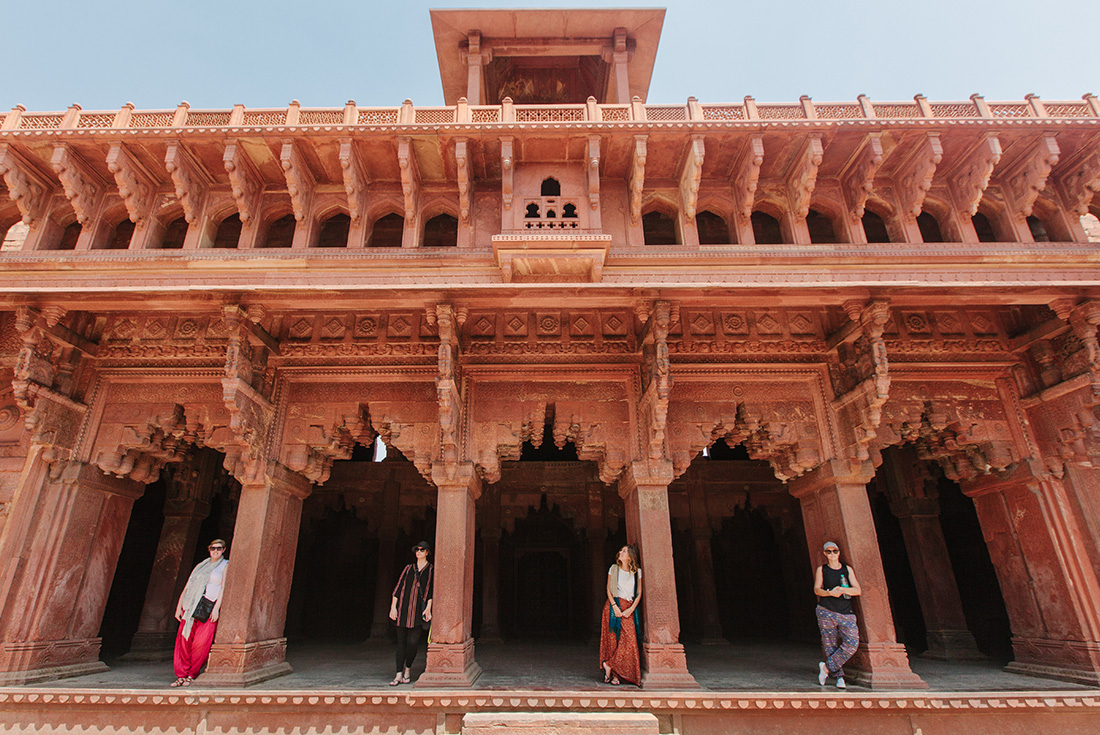
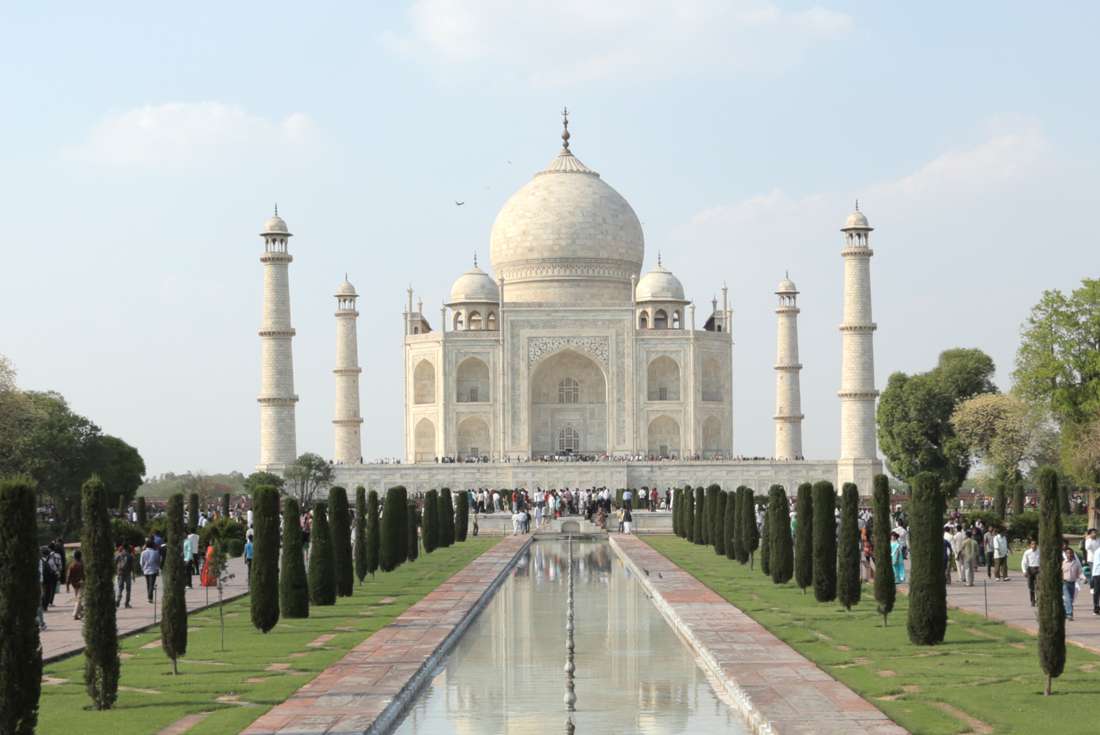
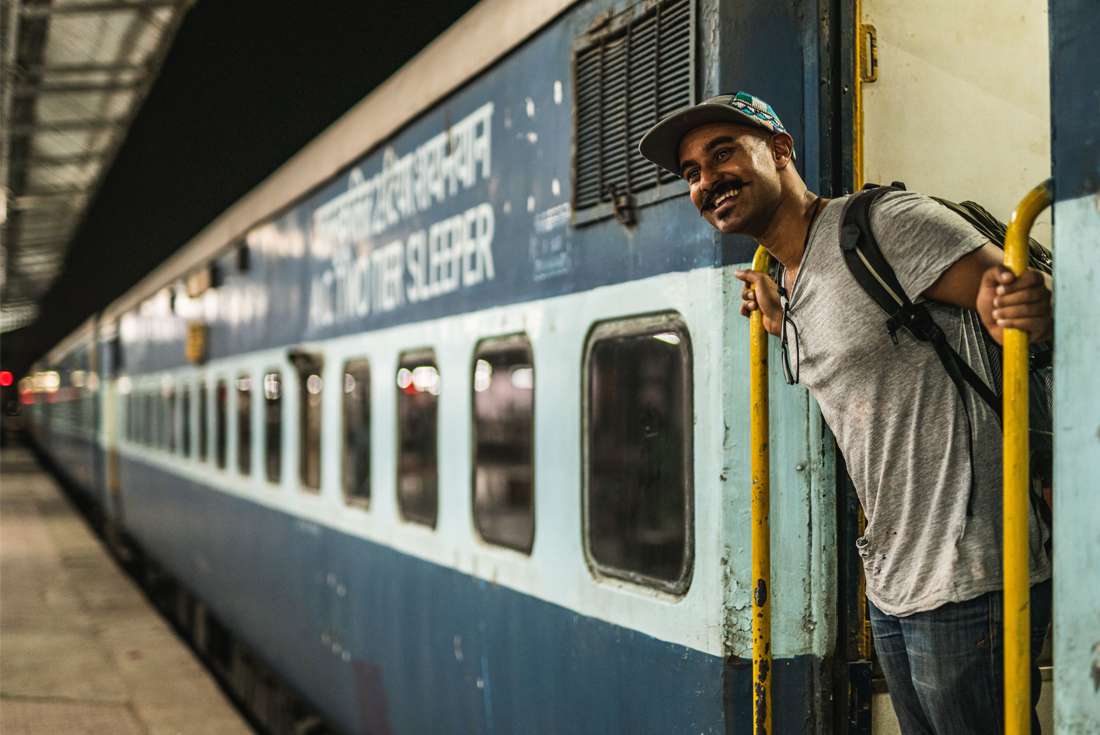
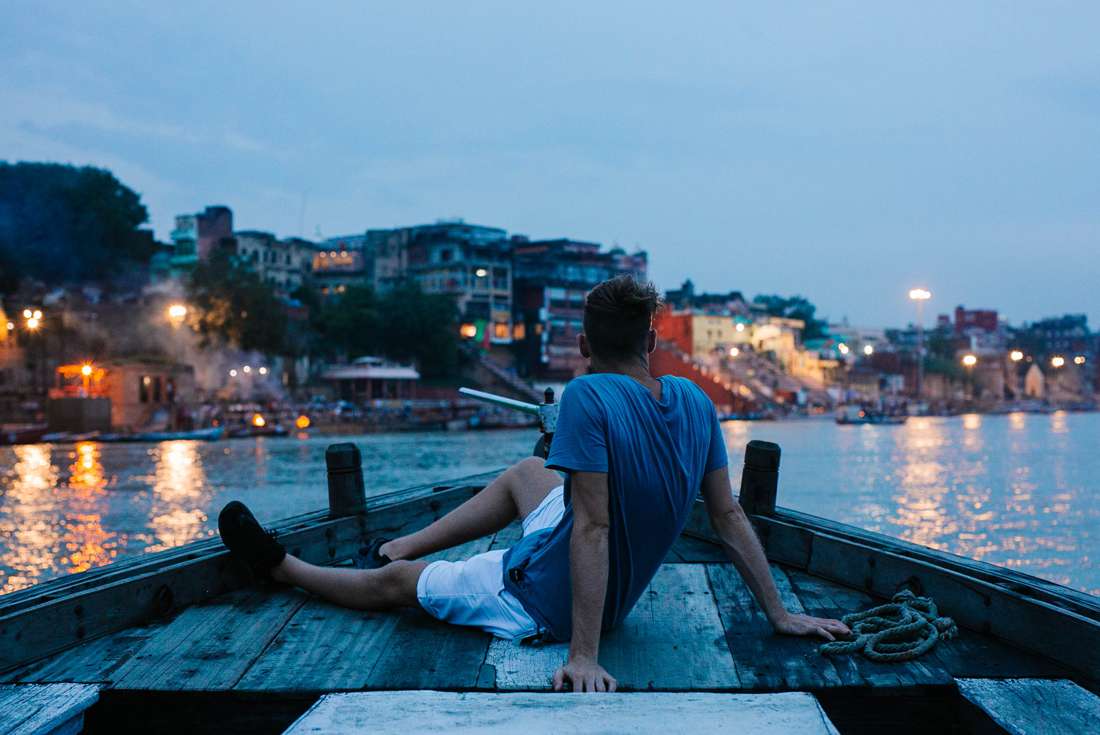
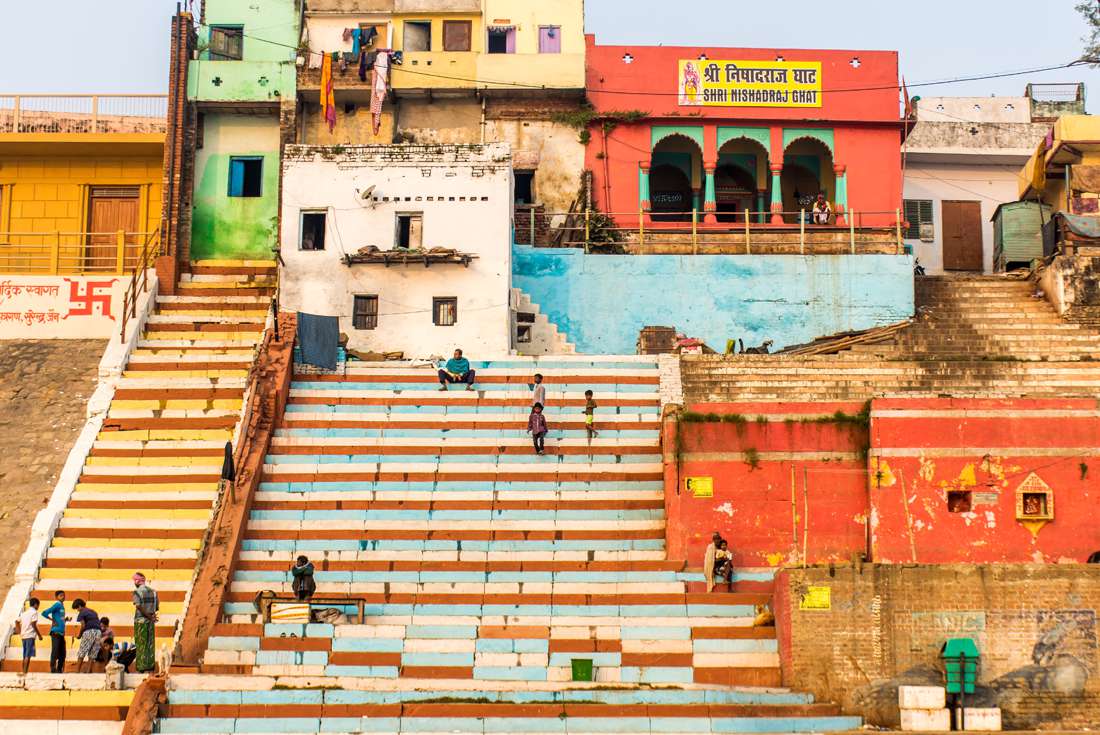
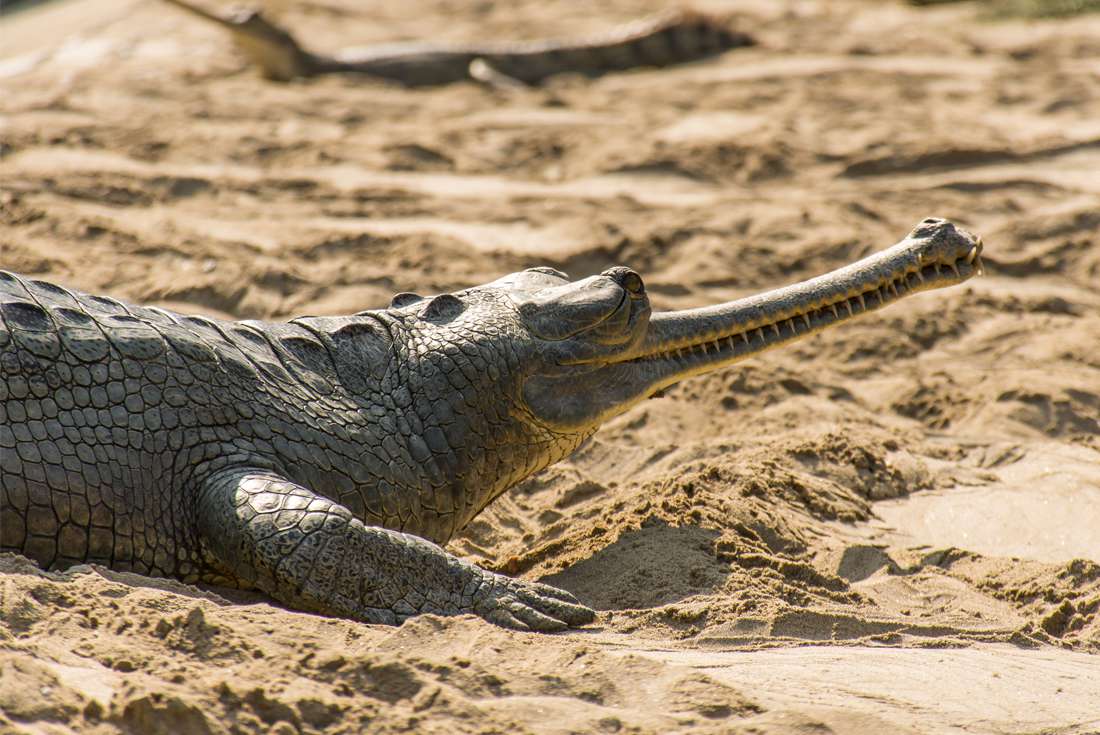
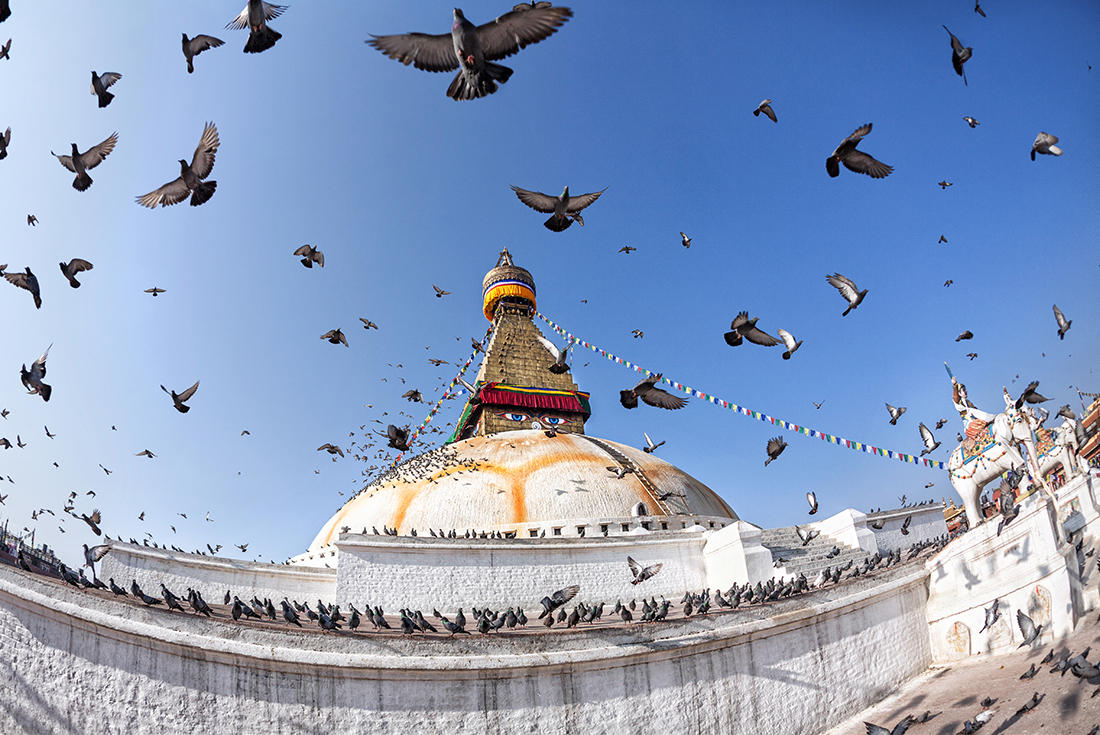
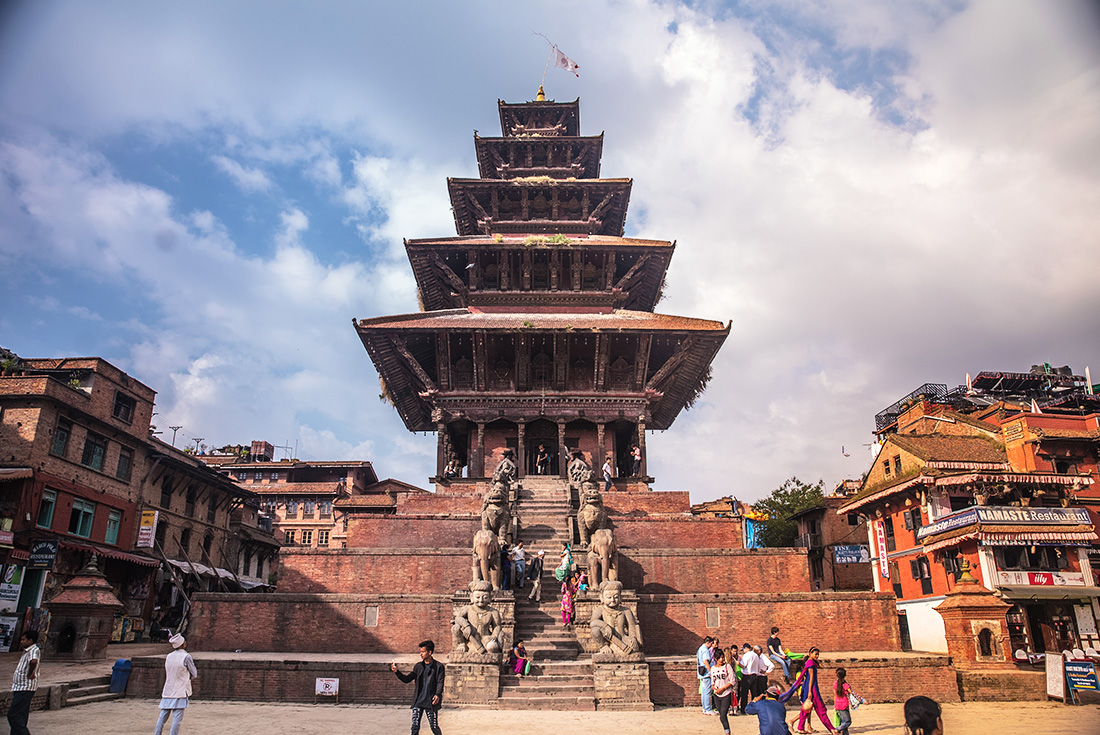
Delhi - Leader-led Old Delhi walking & rickshaw tour
Delhi - Visit to the Jama Masjid Mosque
Delhi - Sheeshganj Gurudwara (Sikh Temple)
Agra - Taj Mahal
Agra - Akbar's Mausoleum
Agra - Agra Fort
Chanderi - Old city walking tour
Orchha - Cooking demonstration
Orchha - Orchha Palace
River Ganges - Boat trip & camping
Varanasi - Sunset candle flower ceremony
Varanasi - Leader-led Old City walking tour
Varanasi - Sunrise Ganges boat trip
Varanasi - Holy City Rickshaw Ride & Food Trail
Lumbini - Heritage Park
Chitwan - Village Bike Tour
Chitwan National Park - Park Entry
Chitwan - Canoe trip
Chitwan - Canoe safari, Bird Watching walk or Jeep safari
Chitwan NP - Tharu cultural performance
Kathmandu - Swayambhunath Temple
Kathmandu - Bodhnath Stupa
Kathmandu - Pashupatinath Temple
Tick off one of the Seven Wonders of the World – the Taj Mahal – during your stay in Agra. An impressive example of Mughal architecture, its carved-marble design is as stunning up close as it is far away.
Enjoy a selection of central Indian staples during an at-home cooking demonstration in Orchha for a tasty and enriching look into authentic Indian family life.
Observe the spiritual moments of pilgrims praying and bathing along the ghats of the sacred Ganges River during an unforgettable sunrise cruise in Varanasi – one of India's holiest cities.
Wake to the calls of the jungle on an overnight lodge stay in Chitwan National Park, then embark on a safari in search of rhino, deer, monkeys and a wide array of birdlife.
Spend a memorable night at Amaltari Madhyavarti Homestay, which provides sustainable incomes and encourages local communities to conserve the wilderness and wildlife around them.
Hotel Magic Tree (Former JP Residency), 15A, 28, Saraswati Marg, Block 15A, WEA, Karol Bagh, , New Delhi, Delhi, INDIA
Hotel Moonlight, #16, Paknajol, Thamel, Bagmati, Kathmandu , Kathmandu, NEPAL, Phone: +977 14980636
1. This trip starts with a welcome meeting at 1 pm on Day 1 in Delhi.
2. A single supplement is available if you’d prefer not to share a room on this trip. The single supplement exclude Day 5 (Sleeper Train), Day 6 (Camping) and Day 10 (Homestay) where you will be in shared accommodation and is subject to availability. Please speak to your booking agent for further information.
Please provide your full name exactly as it appears on your passport at the time of booking (including any middle names listed on your passport. Fees may apply for adding or amending details within 45 days of departure, and in some cases, you will be required to cover the cost of issuing a new ticket.
While we always endeavour to provide the best possible holiday experience, due to the nature of travel and the areas we visit sometimes things can and do go wrong. Should any issue occur while you are on your trip, it is imperative that you discuss this with your group leader or local representative straight away so that they can do their best to rectify the problem and save any potential negative impact on the rest of your trip.
We recognise that there may be times when your group leader or local representative may not be able to resolve a situation to your satisfaction - if this is the case, please ask the group leader or local representative to speak to their direct manager.
You may also choose to provide details in your online feedback, which we ask you to complete within 30 days of the end of your trip. Please do be aware that it is very difficult for us to provide any practical help after the trip is completed, so informing us while still travelling will give us the opportunity to resolve the issue in real-time., For general contact details please use the following page: https://www.intrepidtravel.com/contact-us, In case of a genuine crisis or emergency, you can reach our local office on the numbers below:
, Available for phone call or WhatsApp call on +91 999 900 5019
This trip involves travel on public transport, covering long distances and consequently some long days of travel. Long-distance and overnight trains can often be delayed and occasionally cancelled due to heavy fog between December and February. Some patience will go a long way towards your enjoyment here. Sit back, relax and watch the scenery go by – a book or podcast doesn’t go astray., We do our best to estimate travel times, but these can often change. That's just how it is in these parts and as a result, there's not as much free or independent time as on some other trips., Nepal and north India can get surprisingly cold in winter, please be prepared and pack accordingly. Speaking of the weather, it also has the potential to be very hot, depending on the season. Please make sure you check seasonal weather guides and pick a travel time that suits your comfort level., We've sourced our accommodation carefully and picked the best possible hotels in line with the Intrepid style of travel. Service and accommodation in India may be different from Western standards.
Tick off one of the Seven Wonders of the World – the Taj Mahal – during your stay in Agra. An impressive example of Mughal architecture, its carved-marble design is as stunning up close as it is far away., Enjoy a selection of central Indian staples during an at-home cooking demonstration in Orchha for a tasty and enriching look into authentic Indian family life., Observe the spiritual moments of pilgrims praying and bathing along the ghats of the sacred Ganges River during an unforgettable sunrise cruise in Varanasi – one of India's holiest cities., Wake to the calls of the jungle on an overnight lodge stay in Chitwan National Park, then embark on a safari in search of rhino, deer, monkeys and a wide array of birdlife., Spend a memorable night at Amaltari Madhyavarti Homestay, which provides sustainable incomes and encourages local communities to conserve the wilderness and wildlife around them.
All group trips are accompanied by one of our group leader or local representative. The aim of the group leader or local representative is to take the hassle out of your travels and to help you have the best trip possible. Intrepid endeavours to provide the services of an experienced group leader or local representative however, due to the seasonality of travel, rare situations may arise where your group leader or local representative is new to a particular region or training other group leader or local representative.
Your group leader or local representative will provide information on the places you are travelling through, offer suggestions for things to do and see, recommend great local eating venues and introduce you to our local friends. While not being guides in the traditional sense, you can expect them to have a broad general knowledge of the places visited on the trip, including historical, cultural, religious, and social aspects. At Intrepid we aim to support local guides who have specialised knowledge of the regions we visit. If you are interested in delving deeper into the local culture at a specific site or location then your group leader or local representative can recommend a local guide service in most of the main destinations of your trip.
TRAVEL ADVISORIES & ALERTS
We recommend that you check your government's foreign travel advisory for the latest information about the destination before you travel. You will also need to ensure that your travel insurance covers you for all destinations and activities on your trip. We also recommend saving the phone number for emergency consular assistance for your government’s consulate in the destination/s you’ll be travelling. Links to travel advisories and any current travel alerts for our trips can be found here: https://www.intrepidtravel.com/travel-alerts
PERSONAL SAFETY
Ensure you have a secure method of carrying your passport, phone, credit cards and cash while travelling such as a money belt. Leave all other high value items, including jewellery, at home Use safety deposit boxes at hotels to store your valuables when available and ensure your luggage is lockable. Be aware of the risk of pick-pocketing and petty theft. Exercise caution when walking at night, don’t walk alone and stick to well-lit streets wherever possible. Be vigilant on public transport and look out for your fellow travellers. Take precautions such as carrying your bag in front of you and never leaving personal items unattended.
LGBTQIA+ TRAVELLERS
Intrepid welcomes all LGBTQIA+ customers on our trips, however we operate in parts of the world that are less accepting. We support LGBTQIA+ customers to travel to these destinations and are committed to ensuring they face no discrimination on any part of the trip we control. We recommend you visit Equaldex (https://www.equaldex.com/) and your government's foreign travel advice for LGBTQIA+ travellers when choosing your trip., https://www.intrepidtravel.com/safety-guidelines, WOMEN'S SAFETY:
Women should exercise caution when travelling in India. Reported cases of sexual assault against women are increasing; recent sexual attacks against female visitors in tourist areas and cities show that foreign women are also at risk. While the risk of an incident occurring on your trip is very low, below are some things you can do for your safety and peace of mind when travelling:
- Respect local dress codes and customs, perhaps dressing more conservatively than you do at home
- Avoid isolated areas, including beaches, unlit city streets and village lanes when alone at any time of day
- Avoid travelling alone on public transport, or in taxis or auto-rickshaws, especially at night
- If you have to use a taxi get them from hotel taxi ranks and use pre-paid taxis at airports. Try to avoid hailing taxis on the street. Some cities (including Delhi and Chennai) have special taxi services for women with women drivers
- If you’re being collected at the airport by a driver make sure they have properly identified themselves before you set off.
-When leaving your compartment on overnight trains (ie. going to the bathroom), ask a male travel companion to accompany you where possible
For further information and advice, visit:
http://www.intrepidtravel.com/women-safety-india
https://www.intrepidtravel.com/adventures/india-solo-female-traveller-story/
www.gov.uk/government/policies/supporting-british-nationals-overseas/supporting-pages/advice-for-women-travellers
www.smartraveller.gov.au/tips/women.html
PERSONAL BELONGINGS:
We strongly recommend the use of a neck wallet or money belt while travelling, for the safe-keeping of your passport, air tickets, cash and other valuable items. Leave your valuable jewellery at home - you won't need it while travelling. Many of our hotels have safety deposit boxes, which is the most secure way of storing your valuables. A lock is recommended for securing your luggage.
FREE TIME:
Your group leader or local representative will accompany you on all included activities, however, during your trip you'll have some free time to pursue your own interests, relax and take it easy or explore at your leisure. Please use your own good judgement when selecting an activity in your free time. Please also note that your group group leader or local representative has the authority to amend or cancel any part of the trip itinerary if it's deemed necessary due to safety concerns.
FESTIVALS:
Travelling in India and Nepal during Holi can at times be unsafe - drinking and drug use is more widespread during this holiday. Your group leader or local representative will advise your group on what places to avoid on this day.
It may be necessary to alter your itinerary for the day.
Diwali (a lunar festival generally held from mid-October to mid-November every year) is celebrated by local people letting off fireworks in the street. It can be very noisy for several days with extra pollution caused by fireworks. As there are no restrictions on buying fireworks in India there are often injuries caused by people exploding them inappropriately. During this festival, your group leader or local representative may be required to alter your itinerary to avoid large crowds gathering and using fireworks.
PERSONAL SAFETY:
While travelling there is always the risk of pick-pocketing and petty theft, particularly in the more touristy cities. We recommend that you exercise caution when walking alone at night and encourage you to walk together and only on main, well-lit thoroughfares. Be particularly vigilant on public transport. Simple measures like carrying your day pack on your front, not hanging your bag over the back of your chair and wearing a money belt will reduce any chance that your valuables should go missing.
SCAMS:
Scams involving ATM and credit cards, train tickets, taxis, temple donations and tourist guides operate throughout India. If you are the victim of a scam, report it immediately to the nearest police station. Even though they may not be able to get your money or goods back, they can issue you with an official loss report for insurance purposes., STRIKES:
Demonstrations and protests are common in Nepal, with strikes regularly occurring that may result in curfews or roadblocks being enforced at short notice. At these times, businesses may close and vehicles may not be allowed on the roads. You should avoid any demonstrations or political gatherings and follow local advice, including that of your group leader or local representative in the event of any disruptions.
PETTY THEFT & CRIME:
Pickpocketing and other petty theft is common, especially in places where tourists or foreigners frequent. Take care when walking around at night. Avoid walking on your own and don’t carry large sums of cash. Keep valuables in a hotel safe if possible. Bars and restaurants now close at midnight as part of a government crackdown on illegal activities. Foreigners remaining in bars and clubs after hours have been detained by the police. Police have increased their presence in Thamel and Durbar Marg, popular tourist districts in Kathmandu, in an effort to reduce crime in these areas. You should seek out police if you have been robbed or affected by any crime.
ALTITUDE:
Altitude sickness is a risk, including on the Annapurna, Langtang and Everest Base Camp treks. Please make sure you familiarise yourself with signs and symptoms before you depart and monitor your own health during your trek.
INSURANCE:
Make sure your insurance covers you for your intended activities, including travel and trekking above 3000m if this is included on your itinerary, mountain rescue services and helicopter evacuation costs.
FESTIVALS:
Travelling in Nepal during Holi Festival (23-25 March 2024), can at times be dangerous due to revellers consuming intoxicating substances. The day is often associated with physical violence and danger. Your group leader or local representative will advise you and your group on what places to avoid on this day and it may even be necessary for us to alter your itinerary for the day to avoid putting you or your group leader or local representative in a high-risk situation.
Travelling during the Hindu festival Diwali (12 Nov 2023, 1 Nov 2024) can also be dangerous. During this time there are many displays of fireworks in the streets. It can be very noisy for several days and there is also a lot of pollution caused by the fireworks. As there are no restrictions on buying fireworks there are often injuries caused by people exploding them inappropriately. During this festival, your group leader or local representative may be required to alter your itinerary to avoid any dangerous areas to avoid putting the group at risk.
INTERNAL FLIGHTS:
There have been a number of air accidents in Nepal. We only use airlines that have passed strict safety audits for included internal flights in Nepal, including Buddha Air, Summit Air.
PASSPORT
You’ll need a valid passport to travel internationally and most countries require your passport to have a minimum of 6 months validity, so remember to check the expiry date.
We need your passport information to get everything ready for your trip so it’s important that the information on your booking matches your passport exactly. Please take care to provide the correct details. We recommend carrying a copy of the photo page of your passport while travelling and leaving a copy at home with family or friends.
VISAS & ENTRY REQUIREMENTS
Many countries require a visa and obtaining the correct visa for your trip and any countries you may transit through is your responsibility. We recommend you check your visa requirements as soon as you have booked your trip. This will ensure you have time to prepare your documents and for your visa application to be processed. You can check the entry requirements for your nationality on your government's foreign travel advisories, consular websites or on our page here: www.intrepidtravel.com/visa-entry-requirements, ADDRESS FOR INDIA VISA APPLICATIONS
If you require an address for your visa application please use:
Intrepid India
25/3 East Patel Nagar
Delhi 110008
Phone: +91 11 4500 6400
Day 9 border crossing name from India to Nepal: Belahiya (Bhairahawa) on the Nepal side.
Information not available.
Validity: 01 Jan 2026 to 31 Dec 2026
GENERAL HEALTH
All travellers need to be in good physical health in order to participate fully on this trip. For the safety and wellbeing of yourself and others, if you are unwell prior to travelling, please stay at home and contact us to make alternative arrangements.
When selecting your trip please make sure you have read through the itinerary carefully and assess your ability to manage and enjoy our style of travel. Please note that if in the assessment of our group leader or local representative a traveller is unable to complete the itinerary without undue risk to themselves and/or the rest of the group, we reserve the right to exclude them from all or part of a trip without refund.
You should consult your doctor for up-to-date medical travel information or for any necessary vaccinations before departure. We recommend that you carry a first aid kit as well as any personal medical requirements in their original packaging as they may not easily be obtained while travelling. If you are carrying medication, ensure you check your government's foreign travel advice for any local restrictions or requirements.
, MOSQUITO-BORNE ILLNESSES:
Malaria is a risk in many parts of India, including major cities. Cases of dengue fever are reported, especially in the period after the monsoon. Other mosquito-borne diseases (including Japanese encephalitis, chikungunya fever, and filariasis) also occur. Take preventative measures such as wearing long clothing, using repellent, and being indoors particularly around dusk and dawn. Consult a medical professional regarding prophylaxis against malaria. For more information, see the World Health Organisation's fact sheets: http://www.who.int/neglected_diseases/vector_ecology/mosquito-borne-diseases/en/
AIR POLLUTION:
During winter months (October-February), air pollution levels in parts of India can spike to hazardous levels. Severe pollution can increase the risk of respiratory problems. Those with pre-existing medical conditions, particularly heart and lung conditions, may be especially affected. Your group leader or local representative can assist you to obtain a face mask if required. All customers are encouraged to pack (reusable) face masks as a precaution.
OTHER INFECTIOUS DISEASES:
Water-borne, food-borne, parasitic and other infectious diseases (including meningitis, cholera, typhoid, hepatitis, tuberculosis, diphtheria and rabies) are common in India. Tap water is not safe to drink. Home-made or unlabelled alcohol can be poisonous. Seek medical attention if you suspect food poisoning, if you have a fever or suffer from diarrhea.
ZIKA VIRUS:
India is classified as an ongoing transmission zone for Zika, with confirmed cases in Tamil Nadu and Jaipur. Basic precautions for protection from mosquito bites should be taken by people traveling to Zika transmission areas, especially pregnant women.
INFLUENZA
Cases of influenza A(H1N1) are widespread in India during winter with a number of recent cases in Rajasthan. Discuss influenza vaccination requirements with your doctor or a travel health professional before departing and maintain good hygiene practices by covering your mouth and nose with a tissue when coughing, and washing your hands regularly. For more information, see the World Health Organisation's fact sheets: https://www.who.int/news-room/fact-sheets/detail/influenza-(seasonal)
While travelling with us you'll experience the vast array of wonderful food available in the world. Your group leader or local representative will be able to suggest restaurants to try during your trip. To give you the maximum flexibility in deciding where, what and with whom to eat, generally not all meals are included in the trip price. This also gives you more budgeting flexibility. As a rule, our groups tend to eat together to enable you to taste a larger variety of dishes and enjoy each other's company. If you have dietary requirements and/or food allergies, please let your booking agent know prior to departure., FOOD IN INDIA:
Food is a way of life in India. You can snack for a bargain or dine in the finest Indian restaurants. Generally, you can eat very cheaply in India. There is a huge choice of restaurants and street stalls serving traditional and local Indian food. In bigger restaurants in areas frequented by more tourists, there is a choice between Indian, Chinese and Western-style food. Here are some ideas of what to try: https://www.intrepidtravel.com/adventures/best-food-in-india/
https://www.intrepidtravel.com/adventures/foodies-guide-south-india/
Please note that service in restaurants (especially with a group) can be quite slow so patience is a must.
India caters very well towards vegetarians and vegans with almost all restaurants having a veg and pure veg section of the menu. If in doubt please check with your group leader or local representative. See our guide to eating vegan in India here: https://www.intrepidtravel.com/adventures/india-vegan-food-guide/
Your group leader or local representative will be able to direct you towards restaurants that are known to have better hygiene, especially in tourist areas where they are travelling with our groups regularly. For some more advice on avoiding "Delhi belly", see our article here: https://www.intrepidtravel.com/adventures/how-to-avoid-delhi-belly-in-india/, FOOD IN NEPAL:
In Kathmandu and Pokhara there are plenty of restaurants and cafes for all tastes and budgets. For a glimpse at what traditional Nepali cuisine entails, check out our guide here: https://www.intrepidtravel.com/adventures/guide-to-nepali-cuisine/
Nepal caters very well towards vegetarians and vegans with almost all restaurants having a veg section of the menu. Your group leader or local representative will be able to direct you towards restaurants that are known to have better hygiene, especially in tourist areas where they are travelling with our groups regularly.
SPENDING MONEY
When it comes to spending money on the trip, every traveller is a little different. You know your spending habits better than we do, so please budget an appropriate amount for things like optional meals, drinks, shopping, optional activities, and laundry. Make sure you have read the itinerary and inclusions thoroughly so you know what is included in the trip price and what you may need to pay for while travelling. , INDIA
The official currency of India is the Indian Rupee (INR). Its symbol is ₹. ATMs that accept international debit and credit cards are widely available in larger cities and towns. Cash shortages at ATMs can be a problem in rural areas. The use of credit cards can be restricted, mainly to major hotels, shops and restaurants. Make sure you carry sufficient cash to cover your needs when travelling outside larger cities and towns.
INR is a blocked currency, which means it can only be obtained in India and cannot be exchanged outside India. Ensure you use or exchange all INR before leaving the country.
, NEPAL
The official currency of Nepal is the Nepali rupee (NPR). Its symbol is often displayed as Rs. ATMs can only be found in Kathmandu, Pokhara, and Bhaktapur. Make sure you carry sufficient cash to cover your needs when travelling outside these cities. Money exchange facilities are available in Kathmandu, Namche, Pokhara, Chitwan (only outside the park), and Bhaktapur. Credit cards are not widely accepted.
The Government of Nepal has banned the import, export, and use of 500 and 1000 Indian rupee notes in Nepal. You should ensure you are not carrying these notes on arrival in Nepal as they will be confiscated and you may be fined.
Before departing on a trek or travelling to remote areas, make sure you have enough Nepalese currency to purchase meals and drinks, in the smaller denominations where possible, as there are no ATMs and larger notes (such as NPR 1000) can be difficult to change.
USD cash is the easiest to exchange. We recommend bringing large bills in good condition, 2013 series onwards only. Any old or damaged notes may not be accepted.
NPR is a blocked currency, which means it can only be obtained in Nepal and cannot be exchanged outside Nepal. Ensure you use or exchange all NPR before leaving the country.
, TIPPING
Tipping can be an appropriate way to recognise great service when travelling. While it may not be customary in your home country, it is an entrenched feature of the tourism industry across many of our destinations and is greatly appreciated by the people who take care of you during your travels. It is always best to avoid tipping with coins, very small denomination notes, or dirty and ripped notes, as this can be regarded as an insult rather than the goodwill gesture it is intended to be., OPTIONAL TIPPING KITTY
On Day 1 of your trip, your group leader or local representative may discuss with you the idea of operating a group tipping kitty, whereby everybody contributes an equal amount and your group leader or local representative distributes tips for drivers, local guides, hotel staff and other services included on your trip. Participation in this kitty is your choice, and you are welcome to manage your own tipping separately if you prefer.
The group leader or local representative will keep a running record of all monies spent, which can be checked at any time. Any funds remaining at the end of the trip will be returned to group members. These tips to suppliers are for great service and are in addition to the regular costs paid for the services supplied.
The tipping kitty excludes tips for your group leader or local representative, and providers of optional activities., Optional tipping kitty for this trip: INR 3500 per person.
, YOUR GROUP LEADER OR LOCAL REPRESENTATIVE
Tipping your group leader or local representative is highly appreciated if you feel they’ve provided outstanding services throughout your trip. The amount is entirely a personal preference; however, as a guideline, the recommended amount is 4-7 USD or EUR per traveller per day (in a currency relevant to your destination). Of course, you are free to tip more or less as you see fit, depending on your perception of service quality and the length and involvement of your group leader or local representative on your trip., CONTINGENCY FUNDS
We try to plan for every eventuality, but there are still some things beyond our control. We reserve the right to change an itinerary after departure due to local circumstances or a Force Majeure Event. In such emergency circumstances, the additional cost of any necessary itinerary alterations will be covered by you. Please note we are not responsible for any incidental expenses that may be incurred as a result of the change of itineraries including but not limited to visas, vaccinations or non-refundable flights. Make sure you have access to an extra US$500 for emergencies (e.g. severe weather, natural disasters, civil unrest) or other events that result in unavoidable changes to the itinerary (e.g. transport strikes or cancellations, airport closures). Sometimes these things necessitate last-minute changes to enable our trips to continue to run, and as a result, there may be some extra costs involved. The recommended amount is listed in USD for the relatability of universal travellers, however, local currency may be needed once in the country to cover these costs., COMMISSIONS
Intrepid understands that the receipt of commissions in exchange for recommending particular shops or services is ingrained in the culture of the tourism industry. For this reason, we have established a centralised fund for contributions from recommended suppliers so these can be collected and distributed back into the business. Actively managing the receipt of commissions helps us maintain the level of quality you expect on one of our trips. Travel is always an adventure so Intrepid cannot explicitly guarantee the quality of a product but we aim to provide the best value trips in the market. Please let us know via the feedback form completed after your trip if we are successfully meeting - or exceeding - this objective., SHOPPING
Nepal has strict regulations on taking statues, antiques, and religious art out of the country. To avoid any inconvenience at the airport, we recommend speaking with your tour leader before purchasing these items. They can suggest reputable places to buy these and help ensure you receive the necessary documentation.
https://www.intrepidtravel.com/packing-list, MAIN LUGGAGE
What you need to bring will vary according to when you are travelling. Generally speaking, we recommend you pack as lightly as possible and make sure that you are able to carry and lift your own luggage and walk with it for short distances including up and down stairs and in busy train stations. Our travellers usually find the smaller their luggage is, the more they enjoy the trip not having to worry about carrying heavy bags! Aim to keep your main luggage under 15kg.
Small, wheeled suitcases that can also easily be picked up and carried are the best for travel in this part of the world, although if you prefer, a backpack is also fine. If you are taking overnight trains, or primarily using public transport then the smaller your luggage the easier it will be to store under or above bunks.
DAY PACK
A day pack for carrying essentials when exploring destinations as well as for short overnight stays will be useful. On overnight trains packing this with the essentials you need to access during the trip will also be very useful.
Below are some ideas and helpful tips on what you specifically need for this trip.
ESSENTIALS:
- Lightweight clothing. A mixture of lightweight clothing and warm layers. Clothes should be easy to wash and dry. Maybe bring a change in smart clothes for dinner in bigger cities. Clothing that covers arms and pants/skirts that go past the knee for entry into local temples.
- Closed-in shoes (to protect from cuts/scratches/insect bites on city and countryside walks)
- Sun protection - hat, sunscreen, sunglasses
RECOMMENDED:
- Parts of India can get very cold (ie. below zero!) during winter (Dec to Feb) and northern regions of India are typically cool in the evenings throughout the year. Many hotels in India do not have central heating. We recommend checking local weather advisory websites before departing to get a better understanding of what to expect and how best to pack. Bringing extra layers and a beanie could improve your overall experience.
- Personal medical kit, we recommend you carry items such as mild pain killers, electrolytes, Band-Aids and insect repellent.
- Water bottle. At least 1.5litre capacity. The sale of bottled water contributes to an enormous environmental problem around the world. A large proportion end up in limited landfill or discarded in waterways and natural environments.
- Camera with spare batteries. Our trips have access to power to recharge batteries for phones and cameras most days but we recommend you take a spare battery for your camera.
- A small chain and padlock for overnight trains is handy to keep your luggage safe and secure.
OPTIONAL:
- Sleeping bag. Useful for camping, overnight trains and poorly heated hotels, during the winter months of Dec - Feb
- Sleep sheet
- Earplugs & eye mask
- Swimming costume
- Binoculars for spotting wildlife
OTHER USEFUL THINGS TO TAKE
- Reusable shopping bag for buying supplies for long journeys
- Slippers or flip flops
- Torch/flashlight
- Travel wipes
- Small towel
- Head scarf for women (for when entering temples or mosques)
OTHER THINGS TO CONSIDER
- Check weather in destinations you are travelling to online a few days before you go to make sure you pack appropriate clothing
- Laundry facilities may not be available in all destinations, so make sure you have a few cycles of clothes to tide you over until your next chance to wash
VALUABLES:
Please try to avoid bringing unnecessary valuables, and use your hotel safe. It’s also a good idea to purchase a money belt or pouch that is easily hidden. We strongly recommend that you photocopy or screen shot scan all important documents e.g. air tickets, passport, vaccination certificates etc. and keep the copies.
MORE!
If you need some further tips for packing, you can always check out our ultimate packing list, or read this advice here: https://www.intrepidtravel.com/adventures/what-to-take-to-india/
WEATHER IN INDIA
Due to India's size and topography, there's a huge amount of variation in its climate. We recommend you consider both the season and the part of India you intend to visit, so that you can best pack for your adventure.
For much of the country, a good time to visit India is from September to March with warm days and cool nights.
During winter (December to January), temperatures can get quite cold in Delhi and the north, especially at night. Hotels in some regions may not have adequate heating. In these months you may like to bring thermals for sleeping and a warm jacket for mornings and evenings. Fog can delay trains travelling throughout this region.
Monsoon is from May to October and offers hot and humid conditions. It is not unusual for trains to be delayed, and for activities in towns near rivers and lakes (ie Varanasi) to require amendment at this time of year. Your group leader or local representative will be able to advise you locally on any changes.
During Summer (June to September), temperatures can get extremely hot in Delhi and the north. Itineraries may be amended to avoid the hottest parts of the day. Your group leader or local representative will be able to advise you locally on any changes., FESTIVALS & HOLIDAYS
As a country of many cultures and religions, India has many festivals and public holidays. Here are some of the key dates and events:
HOLI (Festival of Colours)
2026 03-04 March
DIWALI (Festival of Light)
2025 20 October
2026 08 November
RAMADAN (Muslim Holy Month)
2026 17 February – 19 March, SEASONAL INFORMATION:
Nepal's climate varies greatly depending on the season:
JUN - SEP: the monsoon rains (mostly at night) bring landslides in regional areas. Cloud cover often obscures mountain views with rain, mud, and leeches deterring most trekkers at this time of year. Treks running in September can be hot and very humid at lower altitudes. See what it's like to trek during monsoon here: https://www.intrepidtravel.com/adventures/nepal-during-monsoon-season/
MAR-APR: Spring brings warm weather and spectacular rhododendron blooms. A popular time to visit and one of the peak times to trek.
OCT - NOV: Clear skies and warm days make autumn the peak season.
DEC - FEB: Winter brings cold temperatures and snow to the mountains. Good trekking,but remember to rug up. Make sure to bring appropriate winter clothing.
Some towns, including Kathmandu, experience very high levels of seasonal smog which can lead to decreased scenic visibility.
Intrepid won't tolerate any kind of violence, harassment (whether physical, verbal or sexual), or disrespect toward fellow travellers, our teams or local communities.
To ensure the wellbeing of everyone on the trip, decisions made by your group leader are final.
Romantic relationships between travellers and group leader or local representative are not permitted while on trip.
Any behaviour that prevents your leader from continuing the itinerary as planned, breaks local laws or opposes any of these guidelines may result in Intrepid denying your booking or removing you from the trip.
If something concerns you during your travels, please speak to your group leader immediately. Alternatively, you can contact us on the emergency contact number detailed in the Problems and Emergency Contact Information section of this Essential Trip Information.
ACCOMMODATION:
Some of the accommodation along the way is basic or simple, staying in local guesthouses and homestays. Some may have shared bathroom facilities with cold water only. We use a mixture of air-conditioned and non-air-conditioned rooms. Some areas of India experience daily load shedding. This is where the power may be turned off at certain times of the day and usually occurs for a few hours in the early afternoon. Most hotel properties have a restaurant or cafe serving local meals. Many restaurants and hotels do not serve alcohol for religious reasons or due to local laws.
SHOWERS:
Showers at some hotels only have hot water at peak times (usually morning and evening). Outside of these times, you may need to speak to reception to obtain hot water.
ROOM ISSUES:
If you have any issues with your room, please speak to the hotel and your tour leader right away rather than your travel agent so that the problem can be addressed without delay., SLEEPER TRAINS IN INDIA:
Sleeper trains are clean and air-conditioned (fan-cooled at times), a great way to travel long distances and still get maximum time in each place. Depending on the route, we travel 2AC or 3AC class as not all classes are available on all routes. Due to the complexity of the ticket purchasing system and high demand for tickets, we are unable to offer upgrades to other classes.
Second Class or 2 Tier AC (2AC) carriages have 4 berths in the compartment section and 2 berths in the aisle bay and individual reading lights. Third Class or 3 Tier AC (3AC) has 6 berths in the compartment and 2 in the aisle bay. There are a limited amount of sinks and charging points in these classes. During the day, bunks are folded away and serve as seats. Toilet facilities are located at either end of the carriage. There is usually an Indian style squat toilet at one end and a western-style toilet at the other. You will need your own toilet paper or tissues and cleanliness will depend on the number of people using them.
Beds are padded bunks, with sheets, pillow and blanket provided. Some people prefer to bring and use their own sleeping sheet. Your luggage travels with you on the train, so packing light will make your journey more comfortable.
Many trains have a dining carriage or a food/snack cart that is brought through the carriages. There are also plenty of vendors selling tea, coffee, water and snacks during the journey, although the hygiene may not be up to standards you are used to at home.
Please note you may be sharing with other members of your group or locals on a mixed gender basis. Tickets are booked on a real-name basis using your passport details. We book for all members of the group at the same time, but unfortunately, this is no guarantee that we will be accommodated all together on the train. Your leader will do their best to swap with other travellers to allow people who booked together to travel together, but please be aware that this is not always possible. We may at times ask male travellers to swap with solo female travellers for safety considerations.
TRANSPORT IN INDIA:
Main roads in India are usually very busy with an assortment of vehicles from the biggest trucks (who always have right of way) down to bikes (and animals!). Overtaking on blind corners at speed is common as is the total use of the horn as a form of communication. Our leaders have complete authority to remove groups from local transport if the driver is not driving safely. Drivers of our private vehicles are experienced and well trained. if you are uncomfortable with your driver, please always let your tour leader know immediately. Please ensure you wear your seat belt at all times.
TRAVEL TIMES:
Distances in India do not reflect the driving time and to cover 100km may take much longer than you would expect at home, even if much of the route is on a highway.
TRAINS:
India has a massive network of trains and millions of people travel by rail every day. Trains often travel the length of the country over several days. Trains are a great way to see the countryside and get you away from the busy road system. Delays and cancellations are common on trains. Your tour leader will check the train status to see if there are delays and will do their best to keep you informed of any changes.
From December to February, delays are more common, especially in the north of the country due to fog. It’s not uncommon for trains to be delayed for up to 12 hours. On occasion, your trip will may to be rerouted to allow for these delays. Your tour leader in conjunction with our local office will advise any changes to the itinerary.
The Indian Railway system is one of the largest railway networks in the world and quite complex. Seat allocation is completely computerized on a centralized reservation system and we do not have control over seat allocations. Despite booking tickets months in advance of a departure your group's seats, or sleeping berths on overnight trains, maybe spread out within one carriage or multiple carriages of the same class. There’s a chance you’ll be sharing a compartment with local travelers of either gender.
For a detailed look into the experience of travelling by overnight trains read more here: https://www.intrepidtravel.com/adventures/india-trains-guide/
AUTO RICKSHAWS:
On this trip, we travel on the local style of transport called an auto-rickshaw. These small, motorised three-wheeled vehicles are a common form of transport in India and do not have seatbelts.
FLIGHTS:
Airlines in India are of excellent quality. Airports are becoming more modern (especially in the major and tourist cities). To enter the airport, you must have a copy of your flight ticket and passport. Schedule changes and delays do occur, especially when weather conditions make visibility poor.
Travel insurance is compulsory on all our trips for those travelling internationally. We require that, at a minimum, you are covered for medical expenses, including emergency repatriation. If you are travelling within your home country or region, please confirm before travel that you are entitled to access the public medical system easily should an accident occur. We strongly recommend all travellers have a policy that also covers personal liability, cancellation, curtailment and loss of luggage or personal effects. For international trips, you will not be permitted to join the group until evidence of travel insurance and the insurance company's 24-hour emergency contact number has been sighted by your group leader or local representative.
If you have credit card insurance, your group leader or local representative will require details of the participating insurer/underwriter, the level of coverage, policy number, and emergency contact number, rather than the bank's name and your credit card details. Please contact your bank for these details prior to arriving in-country.
For travellers who reside within the European Union, Switzerland or the USA, the requirement to purchase travel insurance cannot be compulsory. However, the purchase of travel insurance is still highly recommended, and each country you visit may have its own specific entry requirements. For example, some mandate travel health insurance for all foreign travellers, regardless of their nationality. Travellers from the European Union, Switzerland or the USA who decline travel insurance when travelling outside their home region must sign a Travel Insurance Waiver Form at the Group Meeting, recognizing personal responsibility for emergency medical and repatriation costs should they arise.
For assistance with travel insurance or other services, please visit the link below:
, https://www.intrepidtravel.com/booking-resources/our-services
As you travel on a group trip you will be exposed to all the pleasures and maybe some of the frustrations of travelling in a group. Your fellow travellers will probably come from all corners of the world and likely a range of age groups too. We ask you to be understanding of the various needs and preferences of your group - patience with your fellow travellers is sometimes required for the benefit of everyone's travel experience. Remember too that you have responsibilities to the group. If you are requested to be at a place at a certain time, ensure that you don't keep the rest of the group waiting. We have found time and time again that the very best trips we operate are those where the dynamics within the group work well - this takes just a little effort on your part. Due to privacy reasons, we are unable to provide you with contact details and any personal information about your fellow travellers booked on your trip prior to departure., SOLO TRAVELLERS
On our trips, rooming is organised on a twin-share basis. We pair up solo travellers with another traveller of the same gender, as per the gender marker on each of their passports.
We also offer an optional single supplement on most trips for travellers who prefer to have their own room. This only applies to accommodation during the tour. Pre-trip and post-trip accommodation booked through us will always be on a single-room basis.
On a small selection of trips some accommodation will be open-gender and multishare, such as a felucca in Egypt or an overnight train in Vietnam. Please review the Accommodation section of the Essential Trip Information for details about your trip.
LGBTQIA+ TRAVELLERS
We strive to create a safe and inclusive environment for everyone. If your gender identity differs from what is indicated on your passport, please contact us so that we can discuss rooming options with you.
ITINERARY CHANGES
Our itineraries are updated regularly throughout the year based on customer feedback and to reflect the current situation in each destination. The information included in this Essential Trip Information may therefore differ from when you first booked your trip. It's important that you review this information prior to travel so that you have the latest updates. Due to weather, local conditions, transport schedules, public holidays, political unrest or other factors, further changes may be necessary to your itinerary once in-country. Your group leader or local representative will keep you up to date with any such changes once your trip is underway and has the authority to amend or cancel any part of the trip itinerary if deemed necessary due to safety concerns.
, OPTIONAL ACTIVITIES
A selection of optional activities that have been popular with past travellers are listed in the day-to-day itinerary. This isn't an exhaustive list and should be used as a guide only for some of what might be available. Prices are approximate, are for entrance fees only, and don’t include transport to and from the sites or local guides unless indicated. All activities are subject to availability, and maybe on a join-in basis. It may not be possible to do all the activities listed in the time available at each destination, so some pre-planning for what you are most interested in is advised. When it's recommended that travellers pre-book these activities, look for a note in the Special Information section of the day-to-day itinerary. For most, they can either be organised independently on the day, or let your group leader or local representative know you are interested at the Welcome Meeting and they can assist.
Where activities are considered medium or high risk, we work with operators whose safety and credentials we have sighted and assessed. Although it is possible that you may find the same activity cheaper with another operator on the ground, we cannot vouch for the safety or quality of that operator. Medium and high-risk activities not listed above have not been assessed by us and as such our staff and group leader or local representative are unable to assist you with organising these activities. Activities that contravene our Responsible Travel policies are also not listed. Please remember that the decision to partake in any activity not listed is at your own discretion and risk.